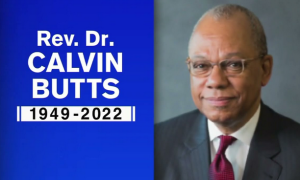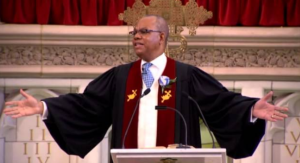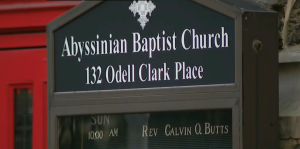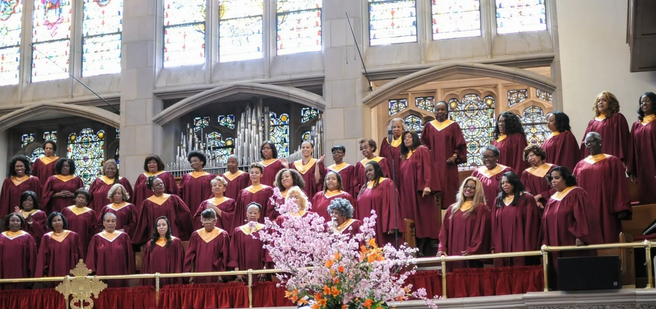By Dr. Kevin McGruder And Gilda Squire
Photos: Adam Clayton Powell\YouTube Screenshots
When Rev. Calvin O. Butts III transitioned on October 28, 2022, The Abyssinian Baptist Church community found itself in not only deep mourning but also an unavoidable, frighteningly uncertain leadership transition. The church was at a real crossroads, one that would come to test the resolve of its members and leaders as the search process towards electing Rev. Butts’ successor began to unfold. The questions most top of mind were what pastor could adequately fill Rev. Butts’ legacy-filled shoes cultivated over the course of his 50-year career at the church, with 30 years as its senior pastor, and in doing so, what would the next chapter of Abyssinian look like?

The answers to these urgent questions were largely in the hands of a 27-person Pulpit Search Committee (PSC). The PSC was made up of 17 Deacons, Trustees and Church Clerks, with 10 church members, all of whom were appointed by Rev. Butts in May 2022, none of which is in alignment with the By-Laws which details that the PSC be appointed by the Diaconate at a duly called church meeting, made up of members in good standing of the church. Consequently, the drama that unfolded over two years brought more questions, along with a lack of confidence and trust in the process on the part of many members.
Rev. Butts’ death was followed by a prolonged search process that concluded last month with the announcement that Kevin R. Johnson had been elected by the congregation as its next pastor. When election results were briefly posted a few days after the June 23rd conclusion of the election, it was noted that 672 members had voted for Rev. Johnson to become pastor, while 535 voted against him. For most decisions at Abyssinian, this would be sufficient. However, Article VII, Section 1 of the By-Laws stipulates that Pastoral Elections have very specific requirements that the pastor receive a majority vote from all members in good standing, not just a majority of those members who voted. The election results indicate that 2,655 members in good standing were sent ballots, which according to the By-Laws indicates that Rev. Johnson needed 1,328 votes to be elected pastor.
It can only be assumed that the writers of this article intentionally stipulated a distinctive benchmark for the election of a pastor because such a decision is one of the most important votes that church members can make. To that end, when there is blurriness around the process, much like any election, there is an understandably perceived threat to the church’s rightful democracy and ultimately, its future.
It’s important to understand that because Baptist churches are congregational churches, each congregation is an independent entity with its members as the foundational layer of its governmental body. Still, there is no hierarchical administrative structure in place when it comes to members making an appeal in situations like this. In essence, there is no real path to course-correction without the participation and acknowledgment of the church’s leadership.
Why is this such a pivotal time in Abyssinian’s history and why does it demand public attention outside of its West 138th Street landmark sanctuary? The Abyssinian Baptist Church, founded in 1808, is one of the oldest, most well-known Black churches in the United States, with a lineage of pastoral leaders who were rooted in democracy and excellence in the Black community for 216 years.
By the end of the 1800s, its Greenwich Village church was the site of major events for New York City’s Black community. Abyssinian came to national attention during the 1908-1937 pastorate of Adam Clayton Powell, Sr., a progressive who combined the self-help philosophies of Booker T. Washington with the advocacy of racial equality of W.E.B. DuBois. After a decade of persuasion, he convinced the congregation to raise funds and move in 1923 to a new “model church” building in Harlem.

Powell, Sr. was succeeded by his son, Adam Clayton Powell, Jr., who during his 1937-1972 pastorate brought the church to international recognition as one of the first megachurches, with a reported membership of 10,000, but also as a base to fight segregation and other forms of racial discrimination. His advocacy work extended to the nation when he became a congressman serving Harlem who passed sixty-six pieces of legislation and chaired President Lyndon Johnson’s House Education and Labor Committee, a major vehicle for implementing Johnson’s Great Society domestic program.
Powell’s successors, Dr. Samuel DeWitt Proctor (pastor from 1972-1989) and Rev. Butts (pastor from 1989 to 2022), built on this foundation, creating the Abyssinian Development Corporation, which played a significant role in the renovation and re-occupancy of hundreds of units of abandoned apartment buildings in Harlem in the 1980s and 1990s. Dr. Butts came to national attention with campaigns against companies that advertised liquor and cigarettes in Black communities, for challenging misogynistic lyrics in hip hop music, and serving as chair of the National Black Leadership Commission on AIDS.
For those reasons and more, Abyssinian is not merely a building that happens to be a church where people worship on Sundays. It is an institution that is deeply embedded in faith, education, economic empowerment, activism, racial equality and social justice. Throughout its history, Abyssinian has inspired many a generation of leaders, community activists, and change agents. This is why the process of selecting and voting on the next pastor must be handled in a way that stands up to historical scrutiny as a means to honor the high standards, integrity, and moral compass for which Abyssinian is well known.
Although Abyssinian’s leadership seems interested in turning the page on the pastoral election, many members inherently know that it is impossible to productively move forward as a congregation with the knowledge that the pastor did not meet the basic requirements for election and received only 25% of the votes of members in good standing. Those who have contacted church leadership regarding their error in announcing Rev. Johnson as pastor have been politely ignored.
No one is under any illusions that this is the only time a church has had irregularities in its pastoral election, knowing how power is often deployed in the church under the guise of faith and unity. However, the historical prominence and visibility of Abyssinian, as well as the clear evidence of a tainted search and election process that ignored the church’s own By-Laws, makes this a case that is worthy of thoughtful interrogation, consideration, and action.
Abyssinian, particularly amongst Black churches, is a beacon of inspiration, hope, and promise and has served as a shining example for other faith institutions. As a pastor recently said to his congregation, “If a church such as Abyssinian Baptist Church fails, so, too, does the Black Church and the very communities beyond their sanctuaries which they serve.”


Kevin McGruder, Ph.D. is a former assistant church clerk of The Abyssinian Baptist Church and co-author of WITNESS: Two Hundred Years of African-American Faith and Practice at the Abyssinian Baptist Church of Harlem; Gilda Squire is a longtime member of The Abyssinian Baptist Church and its Archives & History Ministry.







